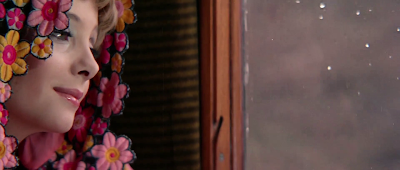John Peel once introduced Pink Floyd’s post-psych, proto-rave “One of These Days (I’m Going to Cut You into Little Pieces”, as being described by Roger Waters as “a poignant appraisal of the contemporary social situation…” before adding, acerbically, “make of that what you will…”
Could the same be said of this upwardly-mobile whodunnit
in which familial betrayal is seemingly at the service of monetary gain?
Jonathan Coe obviously thought so when he used the title for his book
critiquing 1980’s Thatcherite “greedism” but, whilst its view of human nature
is broadly cynical, the Ray Cooney source material is more slapstick farce than
satire. It is in truth, hilariously, no more than the standard British
disregard for upper class human frailty and if anyone’s going to make it out of
this one alive you know it’s more likely to be the down-to-Earth Kenneth Connor
and his mate Sid… oh and Shirley Eaton, of course: have you seen those pins?!
 |
| Shirley and Ken |
As Adam Faith, who makes a late appearance in this film, once
sang: “what do you want if you don’t want money?” Laughs, I suppose?? As it
turns out there’s quite a few of those in What
a Carve Up! Which features some of the finest comedy-performers of their
generation in an age-old yarn about a shadowy house of mystery…
Sid and Ken play miss-matched best mates, sharing
a flat and just about managing as Syd Butler a salesman and Ernest Broughton a
horror novel proof-reader with an over-active imagination. News comes of the
death of a distant relative Gabriel Broughton, the owner of Blackshaw Towers,
and that Ernie must attend the reading of the will.
This bolt from the blue has Ernie dreaming of an
inheritance but after a long trip on a smokey train he and his newly-appointed
“legal advisor”, Syd, make their way through forbidding fog to the family pile:
Blackshaw? Sure it’s black… and very, very dark.
 |
| The clan is gathered |
They are greeted by Fisk (Michael Gough), the ghoulish
family butler and ushered into the huge sitting room to meet Ernie’s family
tree… There’s Guy (Dennis Price), Earnest’s cousin, a heavy drinker whose
sardonic wit is utilised in permanent battle with his grimly-grasping sister
Janet (Valerie Taylor). It’s hard to believe that they’re the off-spring of the
bumblingly-avuncular Dr Edward Broughton (George Woodbridge).
But the Broughton’s seem an odd bunch for whom private
education has not necessarily produced a balanced outlook: Great Aunt Emily
Broughton (the genius Esma Cannon!) is a little confused and is convinced that
the Great War is still on (did it ever really end?) whilst cousin Malcolm (a
wonderful, wide-eyed turn from Michael Gwynn) is an unbalanced musician whose
clearly had one too many Mozarts… he’s convinced it’s not him though but
everybody else and to some extent he’s not wrong!
 |
| Fisk catches up on his reading |
The boys arrive just in time for the start of proceedings
with this grim clan all gathered around the dinning table waiting to hear if
they’ve been left anything by Old Man Broughton as Everett Sloane (dead-deadpan
Donald Pleasence) looks out with cold neutrality from over his spectacles… They
are a most peculiar lot and generally none-too-keen on the mathematical
impications of additional relatives.
But there’s one more to join them, the stunning Nurse
Linda Dixon (the peerless Shirley Eaton, the
sexual superpower of British comedy) who had looked after the old man – is there
anything in the will for her and, as far as Ernie’s concerned, is there any of her in it for him?
 |
| James, Price, Connor and Eaton |
Pretty soon there’s a lot more to concern Ernie’s
over-active imagination as his relatives start being killed off one by one… the
murdered is surely amongst them but who? Will Sid and Ernie find out in time,
will Ernie recover from seeing Nurse Dixon getting changed, is the War really
still on and what’s all this got to do with Adam Faith anyway…
You’ll have to watch it to find out.
Dusty verdict:
If the plot sound familiar that’s because it bears resemblance to both The Old
Dark House and The Ghoul both thirties classics ripe for the Cooney treatment
and updating with extra – intended – laughs for the Carry On generation. It works too even though the humour was
distinctly parochial, the New York Times reviewer being especially scathing of
this “vulgar”, “inept” “ostensible British farce…”
 |
| A classic Connors cor! |
Pat Jackson directs with swift efficiency making the most
of every creaking door, hidden passageway and shadowy figure combing their
effect on nervy-Ernie with a hit on the audience. What the New York Times
failed to recognise is the film’s knowing heart: a post-modern awareness that
is both comforting and satirically funny. Syd and Ken are everymen – thrust into
this madness so we can have a laugh on our behalf, all sat together with
post-war austerity barely giving way to a decade just about to swing.
Well worth a watch and readily available from Amazon and
the rest.



































































